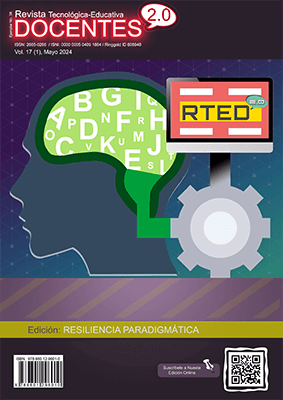Mathematical Models in Education and Technology in Educational Quality
 DOI:
https://doi.org/10.37843/rted.v17i1.492
DOI:
https://doi.org/10.37843/rted.v17i1.492
Main Article Content
Abstract
Science and technology are part of the tools that we cannot do without in the 21st century. The main objective was to analyze education and its role in society from the perspective of how it generates improvements in GDP per capita and how educational quality is not a false promise and illusion. Mathematics in operations research, such as queuing theory and game theory, was used as a paradigm. The population was students and workers from Argentina and Spain, taking case studies from those countries as samples. In addition, a technological approach with the same mathematical instruments as the original models is needed. The hypotheses were demonstrated with samples taken from a population of students and workers from Argentina and Spain. The results were conclusive in knowing that quality education generates greater monetary and other gains in people, raising better educational policies as a discussion and concluding that education begins in the family. An important part of the article is the analysis of the life cycle of systems to conclude on systemic education.
Downloads
Metrics
Article Details

This work is licensed under a Creative Commons Attribution-NonCommercial-NoDerivatives 4.0 International License.
Those authors who have publications in our journal accept the following terms:
- When a work is accepted for publication, the author retains rights of reproduction, distribution of his/her article for exploitation in all countries of the world in the format provided by our magazine and any other magnetic medium, optical, and digital.
- Authors will retain their copyright and guarantee the journal the right first to publish their work, which will be simultaneously subject to the Creative Commons Acknowledgment License (Attribution-NonCommercial-NoDerivatives 4.0 International (CC BY-NC-ND 4.0)). That allows third parties to copy and redistribute the material in any medium or format, under the following conditions: Acknowledgment - You must properly acknowledge authorship, provide a link to the license, and indicate if any changes have been made. You may do so in any reasonable way, but not in a way that suggests you have the licensor's endorsement or receive it for your use. NonCommercial - You may not use the material for a commercial purpose. NoDerivatives - If you remix, transform, or build from the material, you cannot broadcast the modified material. There are no additional restrictions - You cannot apply legal terms or technological measures that legally restrict you from doing what the license allows.
- Authors may adopt other non-exclusive license agreements to distribute the published version of the work (e.g., deposit it in an institutional archive or publish it in a monographic volume) provided that the initial publication in this journal is indicated.
- Authors are allowed and recommended to disseminate their work through the Internet (e.g., in institutional telematic archives, repositories, libraries, or their website), producing exciting exchanges and increasing the published work's citations.
- Request of withdrawal an article has to be done in writing by the author to the Editor, becoming effective after a written response from the Editor. For this purpose, the author or authors will send correspondence via e-mail: [email protected].
- The author will not receive financial compensation for the publication of his work.
- All Docentes 2.0 Journal publications are under the Open Journal System (OJS) platform at: https://ojs.docentes20.com/.
References
Alegsa. (2023). Tecnología Teorema 1. https://n9.cl/bligq
Castillejo Brull, J. L. (1987). Pedagogía sistémica. CEAC.
Effy, O. (2001). Administración de Los Sistemas de Información. Cengage Learning.
Instituto nacional de estadísticas y censos. (2022). Educación Teorema 1. https://n9.cl/y8go4
Mathur, K. (1996). Investigación de operaciones y el arte de la toma de decisiones. Prentice Hall.
Merce Traveset, V. (2007). La pedagogía sistémica, fundamentos y práctica. Grao.
Merce Traveset, V. (2016). Pensar con el corazón, sentir con la mente. Recursos didácticos de educación emocional sistémica multidimensional. Octaedro.
Parellada Enrich, C., & Merce Traveset, V. (2016). Las redes sutiles de la educación. Las ideas clave de la pedagogía sistémica multidimensional. Octaedro.
Salarios España según profesión. (2014). Educación Teorema 1. https://n9.cl/wn66l
Sueldo joven profesional en Argentina. (2023). Educación Teorema 2. https://n9.cl/u85319
Universidad tecnológica nacional Facultad regional Tucumán. (2023). Educación Teorema 1. https://n9.cl/ymxhkj






